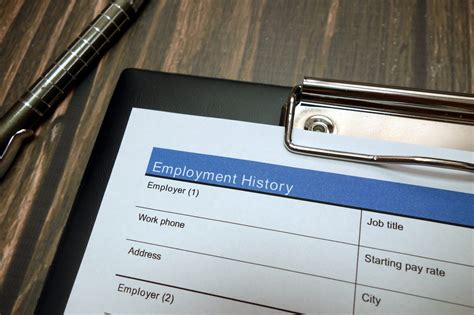Employment History Checks: Employer's Rights

Employment history checks are an essential part of any hiring process. Employers have the right to conduct these checks to ensure that they are making informed decisions about potential hires. However, it’s important to know what rights employers have when it comes to employment history checks and what they can and cannot do. In this article, we will discuss the employer’s rights when it comes to employment history checks.
What are Employment History Checks?
Employment history checks are a type of background check that employers use to verify a job candidate’s work history. These checks can include verifying the dates of employment, job titles, job responsibilities, and reasons for leaving previous jobs. Employers conduct these checks to ensure that they are hiring qualified candidates who have the necessary experience and skills for the job.
Employer’s Rights in Employment History Checks
1. Obtaining Consent
Employers must obtain consent from job candidates before conducting employment history checks. This consent can be obtained through a signed release form or as part of the job application process. Employers cannot conduct employment history checks without the candidate’s consent.
2. Verifying Information
Employers have the right to verify the information provided by job candidates during the hiring process. This includes verifying employment history, education, and other qualifications required for the job. Employers can contact previous employers to verify job titles, dates of employment, and reasons for leaving.
3. Conducting Criminal Background Checks
Employers have the right to conduct criminal background checks on job candidates. However, they must follow state and federal laws when doing so. Employers cannot discriminate based on a candidate’s criminal history unless it is directly related to the job they are applying for.
4. Protecting Confidential Information
Employers must protect the confidentiality of job candidates’ personal information. This includes keeping employment history checks confidential and only sharing the information with those who need to know. Employers must also comply with state and federal privacy laws when conducting employment history checks.
5. Using Third-Party Screening Companies
Employers have the right to use third-party screening companies to conduct employment history checks. However, they must ensure that these companies comply with state and federal laws and protect job candidates’ personal information. Employers must also notify job candidates if they are using a third-party screening company.
What Employers Cannot Do
While employers have the right to conduct employment history checks, there are certain things they cannot do. These include:
1. Discriminating Based on Protected Characteristics
Employers cannot discriminate against job candidates based on their race, gender, religion, national origin, age, or disability. This includes using employment history checks as a way to discriminate against candidates with certain characteristics.
2. Violating Privacy Laws
Employers must comply with state and federal privacy laws when conducting employment history checks. This includes the Fair Credit Reporting Act (FCRA), which sets guidelines for how employers can use consumer reports, including employment history checks.
3. Asking Inappropriate Questions
Employers cannot ask inappropriate questions during the hiring process, such as questions about a candidate’s marital status, sexual orientation, or religious beliefs. These questions are not relevant to the job and can be seen as discriminatory.
Conclusion
Employment history checks are an important part of the hiring process, but employers must follow certain guidelines and laws when conducting them. Employers have the right to obtain consent, verify information, conduct criminal background checks, protect confidential information, and use third-party screening companies. However, they cannot discriminate based on protected characteristics, violate privacy laws, or ask inappropriate questions.
FAQs
1. Can employers conduct employment history checks without a candidate’s consent?
No, employers must obtain consent from job candidates before conducting employment history checks. This consent can be obtained through a signed release form or as part of the job application process.
2. What information can employers verify during employment history checks?
Employers can verify job titles, dates of employment, job responsibilities, and reasons for leaving previous jobs.
3. Can employers discriminate based on a candidate’s criminal history?
Employers cannot discriminate based on a candidate’s criminal history unless it is directly related to the job they are applying for.
4. What laws do employers need to follow when conducting employment history checks?
Employers must comply with state and federal privacy laws, including the Fair Credit Reporting Act (FCRA).
5. Can employers ask inappropriate questions during the hiring process?
No, employers cannot ask inappropriate questions during the hiring process, such as questions about a candidate’s marital status, sexual orientation, or religious beliefs.
